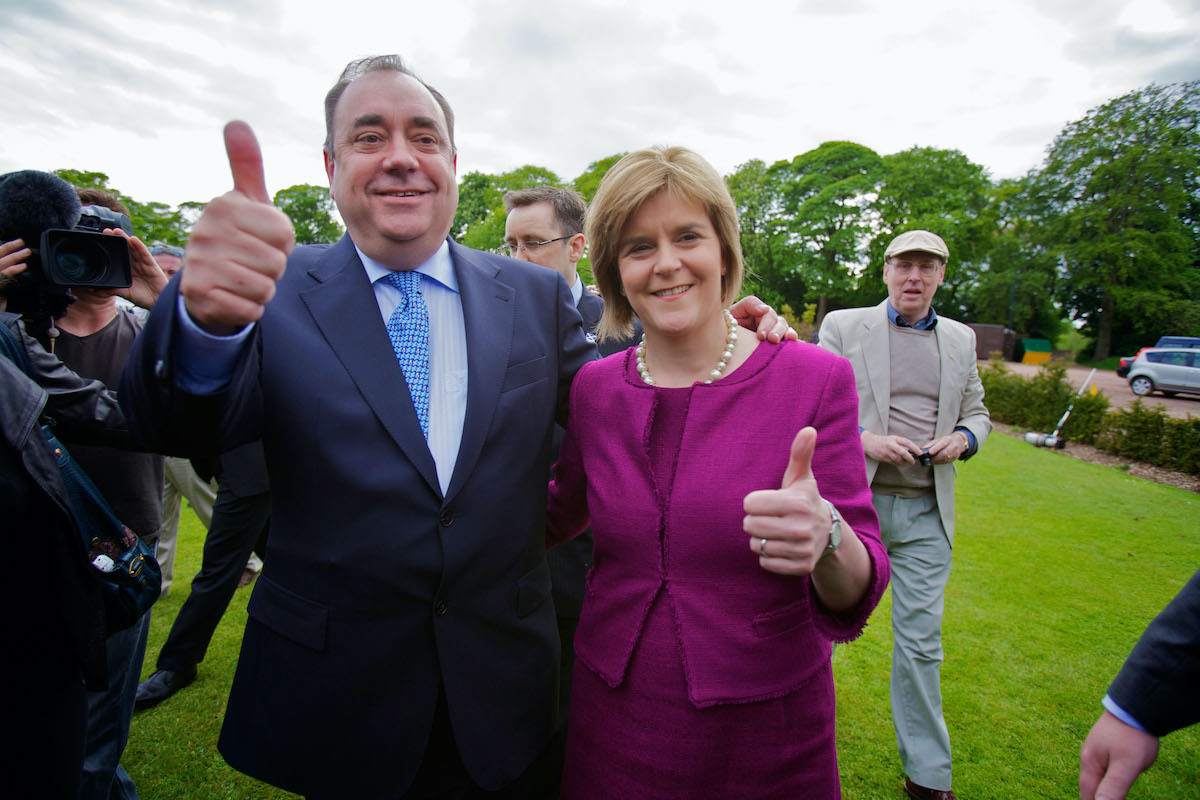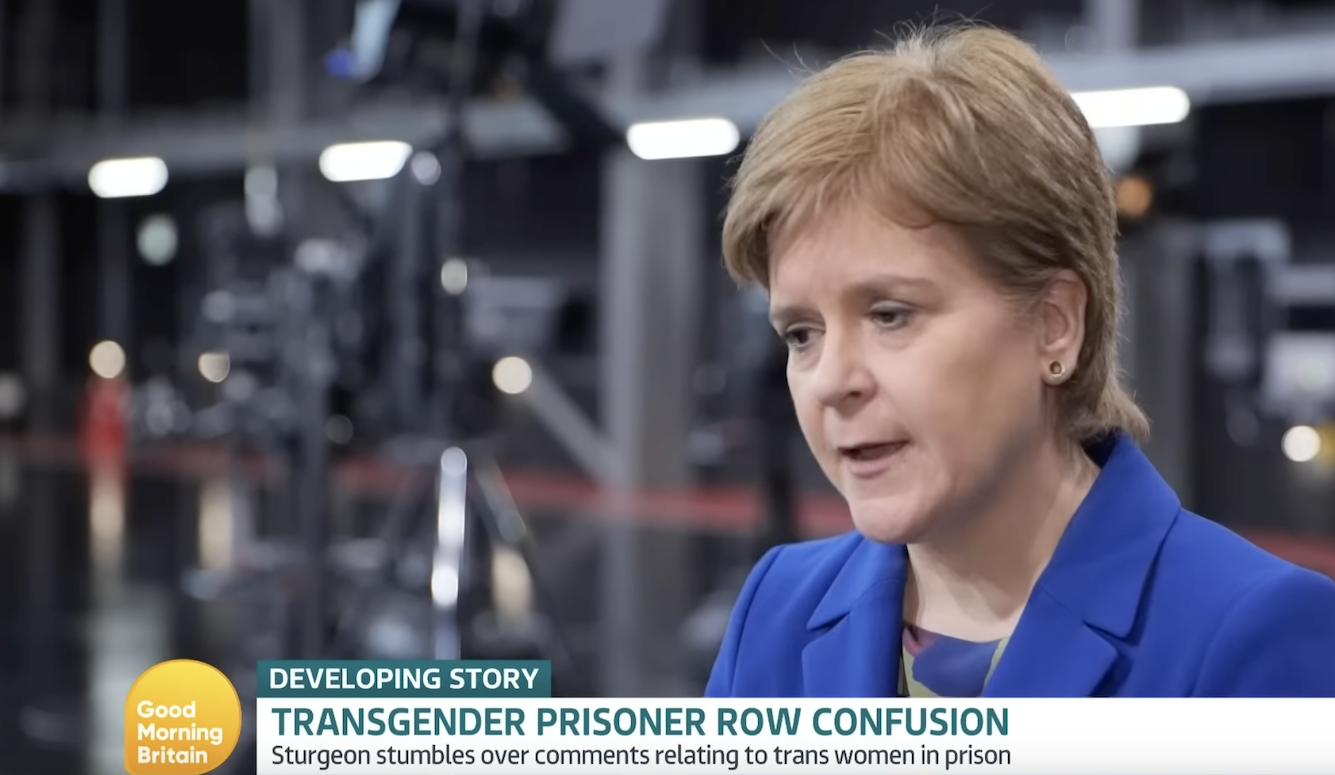Free Speech
Support for Scottish Independence Wanes as the SNP Is Engulfed in Scandal
Sturgeon and the Scottish nationalists have been far more successful at dragging the country into a culture war than improving the everyday life of ordinary Scots.

I live in Scotland. The country known for its beautiful scenery, bagpipes and kilts, and that iconic Scotch whisky. Remember the spelling, or you’ll be put in your place, for Scots are a much more direct bunch than their southerly neighbours. But Scotland is not open to visitors at the moment thanks to the pandemic, so we have all this scenery and whisky to ourselves. What we presently can share with outsiders, however, is a political farce worthy of a banana republic. At the centre of it is First Minister Nicola Sturgeon, the leader of the Scottish National Party, whose reputation hangs in the balance, and at stake are her dreams of securing independence for Scotland.
The debacle over the Alex Salmond case has been covered extensively, and it’s as fast-moving as a political TV drama. The central questions are: did Sturgeon intentionally mislead the Scottish Parliament, and was there a conspiracy to take down Alex Salmond, the former First Minister and Sturgeon’s ex-best friend, orchestrated by Sturgeon and her close circle of trusted allies? The drama ratcheted up again last week, with a cross-party committee of MSPs concluding that Sturgeon had “given an inaccurate account” under oath when testifying to a Scottish parliamentary inquiry into the Salmond affair. Can she survive this latest blow to her reputation? Whatever the denouement, Sturgeon’s brand as a competent, reliable, and morally unimpeachable female leader—a Celtic version of Jacinda Ardern—has been damaged irreparably. Andrew Neil, also a Scot and Chairman of the Spectator, likened Scotland to a “banana republic without the bananas.”
“The stramash between the country’s two most famous politicians, Alex Salmond and Nicola, has resulted in vital public documents being censored or banned, important information being suppressed, the media cajoled and cowed, the legal system brought into disrepute, the Scottish Parliament neutered and even bloggers being threatened with jail,” wrote Neil.
Like other progressive, female politicians, Sturgeon, the daughter of a dental nurse and an electrician, has traded on being a “competent female leader,” in contrast to incompetent male ones. As Douglas Murray puts it, according to this feminist trope, women are somehow both men’s equal in every respect, and their superiors—a trope that’s gathered more velocity during the pandemic. Tut-tutting at the antics of Boris Johnson, the wild-haired, dithering Englishman in charge at Westminster, Sturgeon has positioned herself as a capable, plain-speaking leader who gives it to her people straight at her daily press briefings—briefings that still continue a year after the first lockdown, to the irritation of her political opponents. In the past year, she has sought to one-up Boris at every opportunity, either by locking down a few days earlier, coming out of lockdown a few days sooner, or varying the restrictions 24 hours ahead of the same anticipated variations in England’s restrictions, thereby casting herself as the leader and Boris as the follower.
Most of the time, she tries to differentiate herself from Boris by being less permissive. For instance, although the prevalence of the virus is lower in Scotland than in England, English schools reopened fully for all pupils earlier this month, but in Scotland some children are having to wait until after Easter before resuming face-to-face learning. Sturgeon wants to be seen as more cautious and responsible, even though the damage caused by keeping children out of school for months on end would normally be seen as the opposite of caution. And despite her image as being firmly in control, Scotland’s COVID death rate is scarcely any better than England’s, with nearly half of all deaths occurring in Scotland’s care homes compared to 30 percent in England.
To many on the liberal centre-left, Scotland has seemed like a better-governed, somehow more Scandinavian part of the United Kingdom, and in some places, like the Shetland isles, the feel is distinctly Nordic, thanks to the culture and geography—Shetland has historically close links to Norway, where I’m originally from. But to critics, it doesn’t have the benefits of the Nordic model of social democracy—a high standard of living, a small gap between rich and poor, and high levels of trust—but just the downsides: little tolerance of differing viewpoints (ask a Scottish conservative, if you can find one), higher taxes than in England, and failing public services.
Scottish education, which used to be among the best in the Western world, perhaps even the very best, has fallen behind that of England according to the OECD’s Programme for International Student Assessment.
Sturgeon said back in 2015, when she was elected leader of the Scottish National Party and became First Minister: “Let me be clear. I want to be judged on this. If you are not, as First Minister, prepared to put your neck on the line on the education of our young people then what are you prepared to. It really matters.”
So far, things are not going well by that yardstick. A report ordered by the Scottish government on secondary education was due to be published in February, but the government decided to postpone its release until June after this year’s elections to the Scottish Parliament in May.
Almost one in four of Scotland’s children is living in poverty. This figure is likely to increase in the coming years, with forecasts from the Scottish government indicating it will reach 38 percent by 2031. As for the public deficit, it is already higher than that of England’s in percentage terms, and could increase to around 26–28 percent in 2021, the Institute for Fiscal Studies reported. So Sturgeon’s dream of pulling Scotland out of the United Kingdom and re-joining the European Union looks unlikely to be realised. European countries wanting to be admitted to the EU must demonstrate “sound public finances” by meeting two criteria: their budget deficit must not exceed three percent of gross domestic product and public debt (government debt and that of public agencies) must not exceed 60 percent of GDP. Scotland fails both those tests. Even if the EU was to make an exception for Scotland in order to cock a snook at Westminster, Sturgeon’s plans wouldn’t help the country’s economy. The EU only represents 19 percent of the Scottish export market, whereas the UK makes up 60 percent. The repercussions of independence on the Scottish economy would deal a blow of 11 billion pounds annually, a team of economists at LSE’s Centre for Economic Performance have calculated.

Sturgeon and the Scottish nationalists have been far more successful at dragging the country into a culture war than improving the everyday life of ordinary Scots. The SNP likes to give the impression that Scotland would be better off outside the UK because all that is evil and wrong comes from successive Tory governments in Westminster. This is not a new idea, of course, and some Scots don’t need much convincing that it’s true. At the same time, the SNP has also come down hard on freedom of speech in the freshly passed Hate Crime and Public Order Act.
The Act has been subject to much criticism, and Humza Yousaf, the SNP Justice Secretary, was forced to water down the original version after artists, the BBC, senior police officers, high court judges, and even celebrities like John Cleese protested about the chilling effect it would have on free speech. Not only has the Act increased the number of “protected groups” you can be prosecuted for “stirring up hatred” against and lowered the prosecution threshold for “stirring up” offences, it has removed the “dwelling exemption” whereby you couldn’t be accused of stirring up hatred in the privacy of your own home. Yousaf justified this as follows:
If you are stirring up religious hatred against Jews, with the intent of stirring up religious hatred in your private dwelling, with your children in the room, with friends that you’ve invited over for a dinner party, if they then act upon that stirring up of hatred and they then commit offences—which, you’re right, would then be prosecuted by the law—should the person who, with the intent of stirring up hatred, and their behaviour was threatening or abusive, should they not be culpable? Should they not receive some sort of criminal sanction?
This marks a sinister step on the way to Scotland becoming a more authoritarian society. Merely saying something offensive about someone’s race or nationality—or status as a trans person—could now land you in court. The maximum penalty is seven years behind bars.
Until now, Nicola Sturgeon has been a formidable political force. Hailed as one of the most eloquent leaders in the world, and until recently one of the most popular public figures in the UK after the Queen, she has remained largely untarnished by the SNP’s poor record in office. But in the last few weeks, the cracks are starting to show. Support for the SNP and trust in Sturgeon are falling.
The latest polls suggest the SNP may not win a majority in the Scottish parliamentary elections in May. Whether it’s the result of her mishandling of the Salmond case, the clamping down on free speech or the SNP’s failings on education, there are signs that the reign of the Nats may not go on forever. According to recent polls, more than 60 percent of voters think she should resign if an investigation into whether she broke the Ministerial Code—standards that all political leaders are expected to comply with—concludes that she did, writes James Forsyth in the Spectator. The cross-bench committee of MSPs stopped short of concluding that, but came perilously close.
Even some supporters of independence are wavering. Stuart Campbell, a staunch nationalist, recently said of the SNP: “If they somehow miraculously achieved independence tomorrow, we’d be afraid to live in the Scotland they’re creating.”






